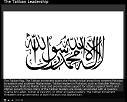|
|
|
Commander Ismail. Image obtained by The Long War Journal from Combine Joint Task Force – 82. |
A senior leader of a Taliban splinter group known as the Bara bin Malek Front, one of the most dangerous insurgent groups operating in northeastern Afghanistan, was killed during a blazing shootout with Pakistani police in the Northwest Frontier Province earlier this week. Security forces opened fire on Mullah Ahmad Shah, better known as his nom de guerre Commander Ismail, after he failed to stop at a police checkpoint near the Afghan border. Ismail was attempting to smuggle a kidnapped Afghan day laborer back to an insurgent hideout on the Afghan side of the border, according to Pakistani security officials who spoke with CBS. Taliban spokesman Zabibullah Mujahid also confirmed the killing of a top Taliban commander in the area according to the same report.
Ismail led a band of 200 well-armed Islamist fighters in Kunar province, one of Afghanistan’s most dangerous areas, and was responsible for a long list of attacks against Coalition forces and Afghan civilians. His group is aligned with foreign fighters loyal to al Qaeda and with the Taliban’s supreme leader Mullah Mohammad Omar, but the group operates independently from the Taliban’s overall command structure. Ismail was on Combine Joint Task Force – 82’s most-wanted list. The Long War Journal has obtained an exclusive photo of Ismail from Combine Joint Task Force – 82.
Ismail’s recent history
Commander Ismail initially fought against the Taliban and al Qaeda in 2001. But he eventually switched sides and later became a key facilitator for foreign fighters traversing and operating in the extremely challenging terrain of the northeast. Ismail briefly served as the Taliban spokesman for Kunar province before creating the Bara bin Malek Front. He has significant ties to al Qaeda leadership, according to a US military document concerning Ismail’s status obtained by The Long War Journal.
During his stint as an insurgent commander, Ismail became a folklore legend to insurgents in Afghanistan in 2005 after claiming responsibility for shooting down a US Special Operations helicopter as it attempted a rescue mission for a four-man team of Navy SEALs who disappeared during Operation Redwing. Three of the missing SEAL team died in the initial ground ambush by Ismail’s men and another 16 US personnel, eight of which were also SEALs, were killed when insurgents shot the helicopter down with a salvo of rocket-propelled grenades. The sole surviving member of the ill-fated team sought refuge from local villagers who nursed him back to health and helped coordinate a successful US rescue mission several days later.
|
Multimedia presentation of the senior Taliban commanders in Pakistan and Afghanistan. Click to view. |
Only three days after the ambush, Ismail narrowly escaped death after a B-52 bombed the compound he was staying at in the remote village of Chechal. Locals claimed a large number of women and children were killed in the strike, which the Coalition later confirmed, but added “enemy terrorists” were also among the dead. According to one source who spoke with the BBC shortly after incident, Ismail left the compound with three Arab men minutes before the strike occurred.
Ismail repeatedly spoke with the media, claiming credit for various attacks and threatening more bloodshed. He spoke with the American news network NBC twice in 2005, once in August and again in December, the latter of which he allowed journalists to videotape his discussion. In the tape, he detailed how he and his men ambushed the Navy SEALs and even presented video footage of the attack. Osama bin Laden reportedly sent a letter praising him and his men shortly after the helicopter was shot down in the summer of 2005.
Ismail’s death may seriously jeopardize the survivability of the Bara bin Malek Front with remaining members choosing to fold into wider known Taliban channels or the al Qaeda element in Kunar led by the elusive Abu Ikhlas al Masri. A Kunar-based Taliban subcommander who spoke with CBS described the possibility Ismail had been killed as “a full-scale blow.”










14 Comments
Great news. Wratchet up the offense and go after these guys. The conflict seems destined to continue spilling over into Pakistan.
Bring it on!!!
Great article Bill, thanks for confirming this. I have a question though. In the article it says:
“Three of the missing SEAL team died in the initial ground ambush by Ismail’s men and another 16 US personnel, eight of which were also SEALs, were killed when insurgents shot the two helicopters down with a salvo of rocket propelled grenades.”
There were 2 helicopters shot down?
The MSM has not reported on it all, but there has been a great deal of unrest and fighting in the past couple of weeks between the radical Islamics and the more secular minded tribes along the Pakistani border with Afghanistan. That is not new. What is new is to read an editorial in a Pakistani newspaper denouncing it wholeheartedly.
The Post: Unfinished business
Matt,
Great update, thanks.
Marlin,
following up on that PK site, I found the following interesting deals between US/PK.
“No drone strikes under new Pak-US deal”
“Washington to announce $7b aid package”
http://thepost.com.pk/Fb_ShortNews.aspx?fbshortid=2936&fcatid=14&fstatus=Current&bcatid=14&bstatus=Current
Some interesting points on corruption, ISI, inverted pyramids rewards by Musharraf to tipsters, etc.
It’ll be very interesting to see how all of this shakes out in the future. The article states that intelligence and law enforcement will move away from ISI and dependence on the military.
Very curious how Pakistan proceeds along this new path and if they can truly weed out corruption, plus how will they ever get rid of Taliban/Al Qaeda rat lines into Afghanistan?
ST333,
I can’t take credit for Matt’s hard work. It was one helicopter, we’ve corrected the error, thanks for the heads up.
This is great news. It makes me very happy to hear this, especially after reading ‘Lone Survivor’ (Marcus Luttrell’s first-hand account of the events–he was the SEAL who survived the attacks).
This just solidifies any doubts about Taliban/AlQaeda in Pakistan. Hopefully the new regime in Pakistan can get a handle on all the corruption so both they and our troops can get in there and wipe out all the rest of the terrorists. Great work by the Pakistani police in getting this guy. At least this guy died fighting like most of the terrorists say they want to do. If you read the story about all the senior al qaeda captured in Iraq 9 of 10 were captured with one fighting to the death. Kind of contrary to their mantra. Let’s keep beating the bushes in Pakistan and get rid of the rest of Al Qaeda,/Taliban and that means all of them from Osama and Ayman to all the rest involved in it.
Could not have happened to a nicer guy. I had no idea this splinter group existed, iam surprised, but good work JTF-82. There have been a few instances of SOC personnel being killed, is this the incident which a group of Rangers, commanded by Capt. Nathan Self, got pinned down after thier CH-46 was shot down in a hot LZ? I don’t want to confuse events. It mentioned that a drone filmed the hadji’s execute a Navy SEAL, and his body was found in the well-fortified bunker. In any event, good work.
Syed Saleem Shahzad makes a couple of claims here. The one that only 75 Arabs are active in the Pakistani ‘war on terror’ theater seems a bit unbelievable, but the one that Punjabis trained in Kashmir are now helping organize the Taliban does seem believable.
Asia Times: Al-Qaeda adds muscle to the Taliban’s fight
The Thunder Run has linked to this post in the blog post From the Front: 04/18/2008 News and Personal dispatches from the front lines.
Bill, thanks for the info regarding the helicopters
Rhyno327/lrsd, you are thinking of Operation Anaconda. If you want a good read about that incident, pick up “Not a Good Day to Die” by Sean Naylor. It’s a pretty good account of the first boots on the ground in Afghanistan right after 9/11 up to and including Operation Anaconda. My respect for the soldiers was at 100% prior to reading that and it went to 200% after completing the book but I can’t say the same for the brass and decision makers. It also shows how our military didn’t “play very well together” in the beginning and the problems that those pissing contest caused for the men on the ground.
Another pageturner I read was very, very good. I breezed right through it. I couldn’t put it down…
was Jawbreaker by Gary Berntsen.
http://www.amazon.com/Jawbreaker-Attack-Personal-Account-Commander/dp/0307237400
Great book.
Ahmad Shah was targeted by the coallition in May 05; the troops were called off because he allegedly “reconcilled.” Then came the late Jun 05 killing of the seal team and shoot down of the CH-53 in a classic RPG trap. That whole missione, which was really on the order of “oh lets go up there and look around and see if we can make contact and then figure out what to do,” was botched from the planning to the execution to the rescue and the commanders should be court martialed.
As for Mangel…Pak papers are also full of anti-west conspiracy theories about Mangel being supported by the CIA. Pak military and ISI stood by while he destroyed a
Sufi shrine about 4 weeks ago. ISI is the problem..but it, as a military organization, follows orders and the orders, to continue to support the Taliban, to hide Al Qa’ida and to try to destroy Afghanistan comes from the highest levels of the Pak government for the most bizarre of what passwes for convoluted 19th century style “strategic imperatives”.
For all those who like to read about terrorism in general. One of the more in depth books “Ghost Wars” by Steve Coll is an excellent read. It follows the history of Afghanistan from the Soviet invasion right up to 9/11. This book will really open your eyes as to exactly how corrupt the Pakistani government, ISI, military really is. The US doesn’t exactly come away with the best reputation from it either. Hopefully as the new government in Pak takes control alot of the corruption will be weeded out and will allow for the continued battle with Al Qaeda/Taliban so we can finally wipe it off the face of the earth. By the way Eugene the shootdown of the helicopters in June of 05 was of I believe army CH47’s not CH53’s.